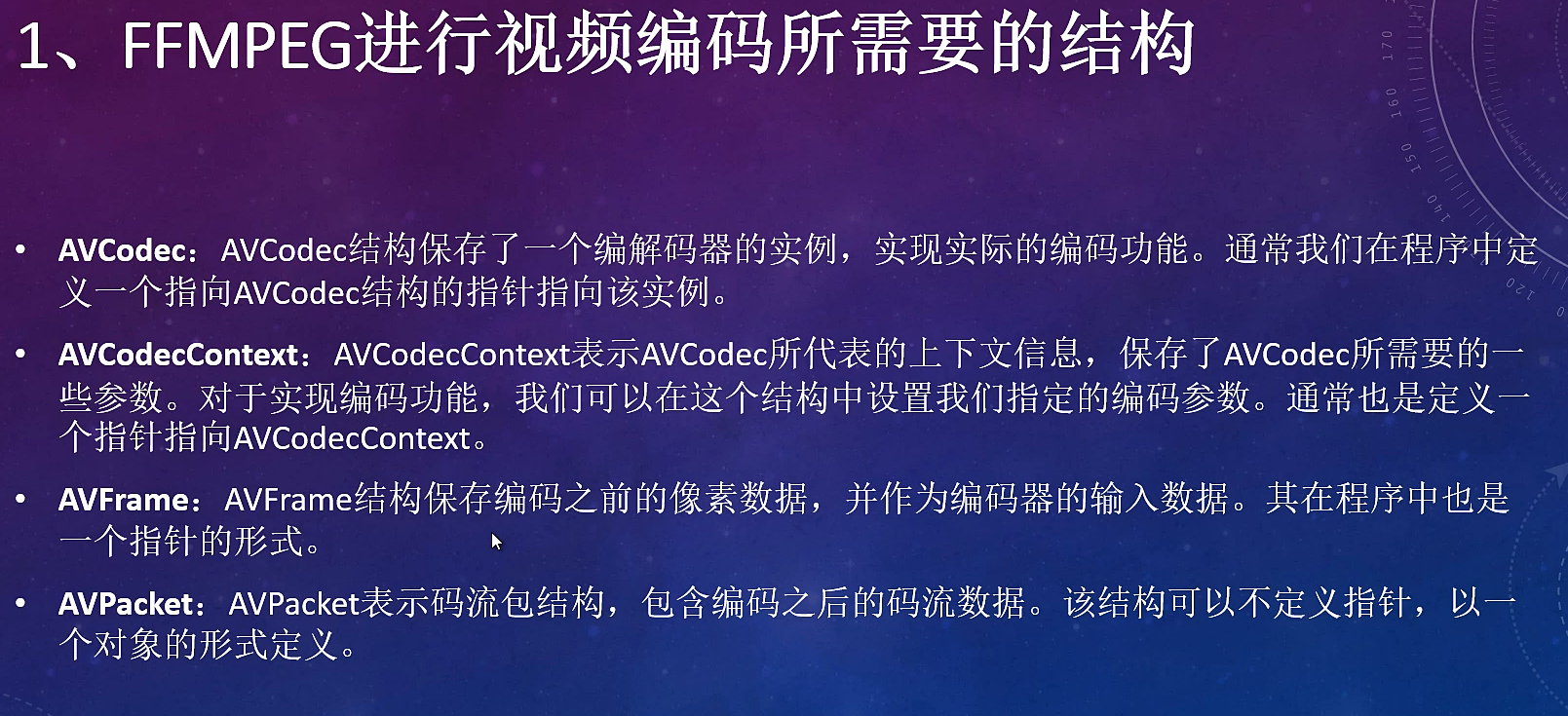02 使用FFmpeg库, YUV420转H264编码
Posted
tags:
篇首语:本文由小常识网(cha138.com)小编为大家整理,主要介绍了02 使用FFmpeg库, YUV420转H264编码相关的知识,希望对你有一定的参考价值。
演示环境:CentOS 7
FFmpeg的H264编码,需要x264库支持
[[email protected] ~]# wget ftp://ftp.videolan.org/pub/x264/snapshots/last_x264.tar.bz2 [[email protected] ~]# tar xf last_x264.tar.bz2 [[email protected] ~]# cd x264-snapshot-20171020-2245/ [[email protected] x264-snapshot-20171020-2245]# ./configure --prefix=/home/x264_dev --enable-shared --enable-static --disable-asm [[email protected] x264-snapshot-20171020-2245]# make && make install [[email protected] x264-snapshot-20171020-2245]# echo ‘/home/x264_dev/lib/‘ >> /etc/ld.so.conf && ldconfig -v #添加x264库到系统路路径
编译安装FFmpeg:
[[email protected] ~]# wget http://ffmpeg.org/releases/ffmpeg-3.4.tar.bz2 [[email protected] ~]# tar xf ffmpeg-3.4.tar.bz2 [[email protected] ~]# cd ffmpeg-3.4 [[email protected] ffmpeg-3.4]# export PKG_CONFIG_PATH=/home/x264_dev/lib/pkgconfig/:$PKG_CONFIG_PATH #根据PKG_CONFIG_PATH的值寻找x264库路径 [[email protected] ffmpeg-3.4]# ./configure --prefix=/home/ffmpeg_dev --enable-shared --enable-static --disable-optimizations --disable-x86asm --enable-libx264 --enable-gpl --disable-cuvid --disable-cuda [[email protected] ffmpeg-3.4]# make && make install [[email protected] ffmpeg-3.4]# echo ‘/home/ffmpeg_dev/lib/‘ >> /etc/ld.so.conf && ldconfig -v #添加FFmpeg的库到系统路路径 #说明:若需使用x264需要 安装x264库:--enable-libx264 --enable-gpl # 关闭GPU视频硬件加速的库: --disable-cuda --disable-cuvid # 生成静态库与动态库 --enable-shared --enable-static
下载测试视频,截取一段转为yuv格式(从第5秒,截取20秒)
[[email protected] ~]# cd /home/ [[email protected] home]# wget http://sh.yinyuetai.com/uploads/videos/common/0E3E014EBF3448D901AF3519C4A1D4E0.mp4 [[email protected] home]# /home/ffmpeg_dev/bin/ffmpeg -ss 5 -t 20 -i 0E3E014EBF3448D901AF3519C4A1D4E0.mp4 -s 1280x720 -pix_fmt yuv420p 1280x720_yuv420p.yuv [[email protected] home]# /home/ffmpeg_dev/bin/ffmpeg -ss 5 -t 20 -i 0E3E014EBF3448D901AF3519C4A1D4E0.mp4 -s 1280x720 -pix_fmt yuv422p 1280x720_yuv422p.yuv
FFmpeg 常见的结构体
YUV420转h264源程序:
[[email protected] ffmpeg_dev]# cat main.c #include <stdio.h> #include <stdlib.h> #include "libavutil/imgutils.h" #include "libavutil/samplefmt.h" #include "libavutil/opt.h" #include "libavformat/avformat.h" const char *inputFileName = NULL; const char *outputFileName = NULL; int frameWidth = 0; int frameHeight = 0; int bitRate = 0; int frameTotal = 0; FILE *pFileInput = NULL; FILE *pFileOutput = NULL; AVCodec *codec = NULL; AVCodecContext *codecCtx = NULL; AVFrame *frame = NULL; AVPacket pkt; static int parse_input_paramaters(int argc, char **argv) { inputFileName = argv[1]; outputFileName = argv[2]; pFileInput = fopen(inputFileName, "rb"); if(NULL == pFileInput) { printf("open file ERR: [%s] \n", inputFileName); return -1; } pFileOutput = fopen(outputFileName, "wb+"); if(NULL == pFileInput) { printf("open file ERR: [%s] \n", outputFileName); return -1; } frameWidth = atoi(argv[3]); frameHeight = atoi(argv[4]); bitRate = atoi(argv[5]); frameTotal = atoi(argv[6]); return 0; } static int read_yuv_data(int color) { //color = 0 -> Y //color = 1 -> U //color = 2 -> V int color_height = color == 0 ? frameHeight : frameHeight / 2; int color_width = color == 0 ? frameWidth : frameWidth / 2; int color_size = color_height * color_width; int color_stride = frame->linesize[color]; if(color_width == color_stride) { //printf("color_width == color_stride,color=[%d],color_stride=[%d] \n", color, color_stride); fread(frame->data[color], color_size, 1, pFileInput); } //else //{ // printf("color_width != color_stride,color=[%d] \n", color); // int i; // for(i = 0; i < color_height; i++) // { // fread(frame->data[color] + i * color_stride, color_width, 1, pFileInput); // } //} return color_size; } int main(int argc, char **argv) { if(parse_input_paramaters(argc, argv) == 0) { printf("inputFile:%s \n", inputFileName); printf("outputFile:%s \n", outputFileName); printf("Frame resolution::[%d*%d] \n", frameWidth, frameHeight); printf("freamToEncode=%d\n", frameTotal); printf("rate:%d \n", bitRate); } else { printf("init ERROR\n"); return -1; } avcodec_register_all();//注册编解码组件 codec = avcodec_find_encoder(AV_CODEC_ID_H264);//查找编解码器 if(NULL == codec) { printf("find AV_CODEC_ID_H264 fail! \n"); return -1; } //分配AVCodecContex实例 codecCtx = avcodec_alloc_context3(codec); if(NULL == codecCtx) { printf("avcodec_alloc_context3 ERROR\n"); return -1; } //设置编解码器的参数 codecCtx->width = frameWidth;//帧高 codecCtx->height = frameHeight; codecCtx->bit_rate = bitRate;//比特率 AVRational r = {1, 25};//设置帧率 codecCtx->time_base = r;//设置帧率 codecCtx->gop_size =12; codecCtx->max_b_frames = 1; codecCtx->pix_fmt = AV_PIX_FMT_YUV420P; av_opt_set(codecCtx->priv_data, "preset", "slow", 0); //打开编码器 if(avcodec_open2(codecCtx, codec, NULL) < 0) { printf("avcodec_open2 ERR\n"); } frame = av_frame_alloc(); if(NULL == frame) { printf("av_frame_alloc err \n"); return -1; } //分配AVframe及像素存储空间 frame->width = codecCtx->width; frame->height = codecCtx->height; frame->format = codecCtx->pix_fmt; if(av_image_alloc(frame->data, frame->linesize, frame->width, frame->height, frame->format, 32) < 0)//32 表示对齐 { printf("ERROR av_image_alloc\n"); } int i; for(i = 0; i < frameTotal; i++) { av_init_packet(&pkt); pkt.data = NULL; pkt.size = 0; read_yuv_data(0); read_yuv_data(1); read_yuv_data(2); frame->pts = i; int got_packet; //int avcodec_encode_video2(AVCodecContext *avctx, AVPacket *avpkt, const AVFrame *frame, int *got_packet_ptr); if(avcodec_encode_video2(codecCtx, &pkt, (const AVFrame *)frame, &got_packet) < 0) { printf("avcodec_encodec_video2 ERR \n"); return -1; } if(got_packet) { printf("Write packet of frame [%d], size=[%d] \n", i, pkt.size); //size_t fwrite(const void *ptr, size_t size, size_t nmemb, FILE *stream); fwrite(pkt.data, 1, pkt.size, pFileOutput); av_packet_unref(&pkt); } } int got_packet = 1; while(got_packet) { if(avcodec_encode_video2(codecCtx, &pkt, NULL, &got_packet) < 0) { printf("avcodec_encodec_video2 ERR \n"); return -1; } if(got_packet) { printf("Write cache packet of frame [%d], size=[%d] \n", i, pkt.size); fwrite(pkt.data, 1, pkt.size, pFileOutput); av_packet_unref(&pkt); } } fclose(pFileInput); fclose(pFileOutput); avcodec_close(codecCtx); av_free(codecCtx); av_freep(&frame->data[0]); av_frame_free(&frame); return 0; } [[email protected] ffmpeg_dev]#
makefile文件
[[email protected] ffmpeg_dev]# cat makefile FLAGS = -Wall -g INCLUDEPATH = -I /home/ffmpeg_dev/include/ LIBPATH = -L /home/ffmpeg_dev/lib/ LIBS= -l avcodec -l pthread -l avutil -l m -l dl -l swresample exe=yuv2h264 $(exe): gcc main.c ${FLAGS} ${INCLUDEPATH} ${LIBPATH} ${LIBS} -o [email protected] clean: rm -rf ${exe} [[email protected] ffmpeg_dev]#
编译并运行,将YUV420文件转为H264
[[email protected] ffmpeg_dev]# cat auto.sh make clean make #提示 : Potplayer可以直接播放H264文件 #程序名: YUV420P文件名, H264输出文件名, YUV的宽与高, 压缩比特率, 需要编码多少帧(不要大于YUV文件的帧数) ./yuv2h264 1280x720_420P.yuv 1280x720.h264 1280 720 819200 250 [[email protected] ffmpeg_dev]#
播放器打开H264文件:
本文出自 “李春利” 博客,请务必保留此出处http://990487026.blog.51cto.com/10133282/1974942
以上是关于02 使用FFmpeg库, YUV420转H264编码的主要内容,如果未能解决你的问题,请参考以下文章

